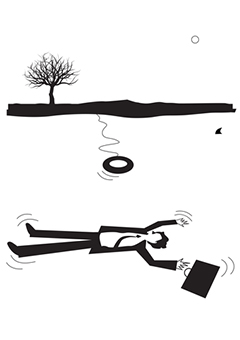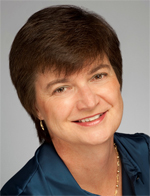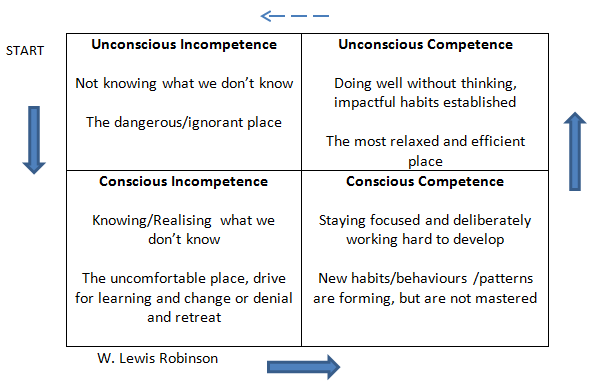By Lesley Matile
 Individuals and businesses often fail if they continue doing what made them successful for a little too long. Why? One reason is that success can make some leaders blinkered “…I know what I’m doing, no need for me to question myself, I’m very successful, after all…”
Individuals and businesses often fail if they continue doing what made them successful for a little too long. Why? One reason is that success can make some leaders blinkered “…I know what I’m doing, no need for me to question myself, I’m very successful, after all…”
Long-standing leaders – however effective they are – need to be experts in the art of self-monitoring, recognising immediately when they begin to drift towards personal complacency. But how can we halt that drift and what can we do to ensure we keep our antennae up?
Models and frameworks are often a helpful way for us to shape our thinking and plot our progress. The Robinson model is a useful lens for leaders to notice that drift towards complacency. It’s primarily a learning and change cycle, describing the four stages of learning.
There are many areas and subjects where we have little or dated knowledge but where we don’t recognise our own ignorance. We often believe we are taking an informed position but we are not. We simply don’t know what we don’t know. This stage is called unconscious incompetence and is principally about our blind spots. It is a dangerous place to be!
Our real learning begins when we recognise that we do not know everything. As this insight emerges, we are said to be conscious of our incompetence. For adults, this is a place of discomfort; we feel exposed, vulnerable, embarrassed. We now have a clear choice; dismiss or bury all the gathering evidence about our incompetence, kidding ourselves that we really do know best, or face up to the facts and learn the new knowledge and skills that will fill that gap – and quickly.
With learning and deliberate, considered action, we can make conscious changes and begin to create an alternative pathway to renewed competence. As we develop we become consciously competent, but have not yet mastered those new behaviours. But as long as we remain focused and alert, we succeed.
With sustained effort, we form new habits that eventually become automatic, easy and effective. We have now reached unconscious competence and enhanced performance follows. We are at the top of our game.
But critically, we must fiercely guard against slipping back again into unconscious incompetence as we stagnate once more and, over time, become perfectly suited for a world which no longer exists!
The problem is that drift from unconscious competence to unconscious incompetence creeps up on us. Our ego gets in the way. Busyness crowds our day. So what may be helpful as preventative measures? I would suggest that everything starts with increased self-awareness.
1. Humility. Let’s work on the basis that what made us great this year is likely to make us at best, average next year. Check arrogance by listening to what we say about ourselves when off guard. Comments from others may be just what we need. Others may even be right! (which of course, doesn’t make us wrong but rather makes us flexible in thinking and behaviours)
2. Be open and curious. How often do we say, “Yes, but. . .” which frequently means we are defending our position when given feedback rather than exploring, seeking clarity and asking for more information. Let’ try instead, “I’m really interested in those comments, share more of your thinking.” If we constantly interrupt to correct others we may not be listening. As Stephen Covey put it, “listen with a view to understanding, not replying”.
3. Look afresh. Start to take notice of what we are automatically discounting – from not noticing subtle changes, to not seeing new information as relevant, important or significant. When we hear ourselves saying things like “that’s only because… that doesn’t affect me… that’s not relevant…”, we need to press the rewind button.
4. Be courageous. Great leaders welcome a level of vulnerability in themselves, not seeing this as weakness but instead, having sufficient courage and self-belief to drop their guard long enough for the truth to permeate! With new insights, they act. That’s real courage.
5. Genuine communication. We need to actively create an open work environment to encourage the regular supply of ideas, thoughts and observations from others. We can particularly welcome contributions from those with fresh eyes who have not yet adopted ‘group think’ and are not so immersed in the culture that they no longer notice the obvious signals that new thinking and action is required, now to prevent that drift.
So, keep your antennae up and stay out of the danger box of unconscious incompetence and keep our businesses fresh.
 Lesley Matile is an established speaker who is new to the Academy for Chief Executives. Her passion is helping others find and use powerful sources of intrinsic motivation to achieve sustained success. As a former probation officer working with high risk, entrenched offenders, Lesley knows a thing or two about problem recognition, overcoming resistance and helping others find the determination to pursue personal change. As a Coaching Master Practitioner (EMCC) Lesley splits her time between executive coaching and high impact training.
Lesley Matile is an established speaker who is new to the Academy for Chief Executives. Her passion is helping others find and use powerful sources of intrinsic motivation to achieve sustained success. As a former probation officer working with high risk, entrenched offenders, Lesley knows a thing or two about problem recognition, overcoming resistance and helping others find the determination to pursue personal change. As a Coaching Master Practitioner (EMCC) Lesley splits her time between executive coaching and high impact training.
